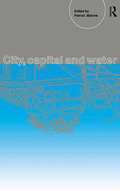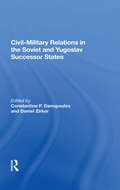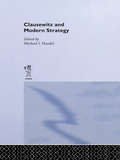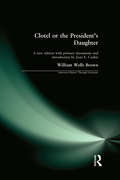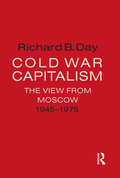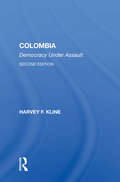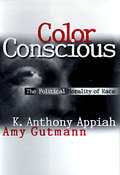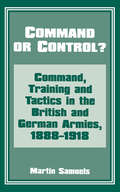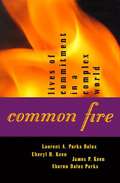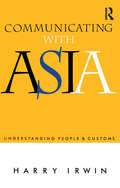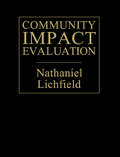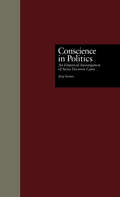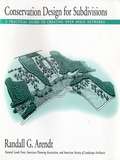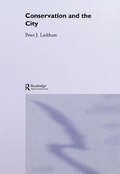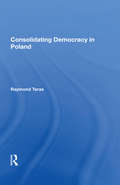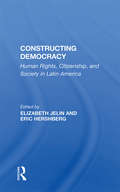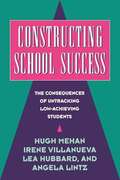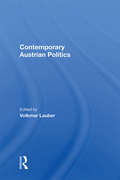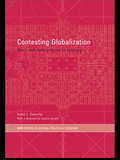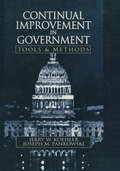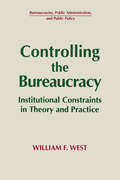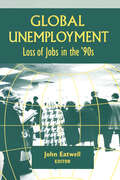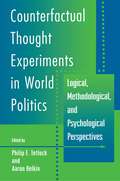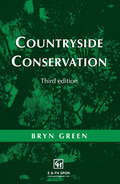- Table View
- List View
City, Capital and Water
by Patrick MaloneThe urban waterfront is widely regarded as a frontier of contemporary urban development, attracting both investment and publicity. City, Capital and Water provides a detailed account of the redevelopment of urban waterfronts in nine cities around the world: London, Tokyo, Kobe, Osaka, Hong Kong, Sydney, Toronto, Dublin and Amsterdam. The case studies cover different frameworks for development in terms of the role of planning, approaches to financing, partnership agreements, state sponsorship and development profits. The analysis also demonstrates the effects of economic globalization, deregulation, the marginalization of planning and the manipulation of development processes by property and political interests.
Civil-military Relations In The Soviet And Yugoslav Successor States
by Constantine P. DanopoulosFrom open civil war in Bosnia and Georgia to the Russian president’s use of military units against an uncooperative parliament, civil-military conflicts in the former USSR and Yugoslavia are increasingly attracting world-wide attention and concern. This volume brings together fourteen essays that explore the roles of the armed forces in the ongoing struggles for control over the processes of state formation and government in these newly independent countries. Twelve chapters focus on the experiences of particular countries in the region; and introductory and concluding chapters draw out commonalities and differences among the cases, comparing them with one another as well as with post-authoritarian regimes elsewhere in the world.
Clausewitz and Modern Strategy
by Michael I. HandelPublished in 1996, Clausewitz and Modern Strategy is a valuable contribution to the field of Military & Strategic Studies.
Clotel, or the President's Daughter: A Narrative Of Slave Life In The United States (1853)
by William Wells Brown Joan E. CashinOriginally published in 1853, Clotel is the first novel by an African American. William Wells Brown, a contemporary of Frederick Douglass, was well known for his abolitionist activities. In Clotel, the author focuses on the experiences of a slave woman: Brown treats the themes of gender, race, and slavery in distinctive ways, highlighting the mutability of identity as well as the absurdities and cruelties of slavery. The plot includes several mulatto characters, such as Clotel, who live on the margins of the black and white worlds, as well as a woman who dresses as a man to escape bondage; a white woman who is enslaved; and a famous white man who is mistaken for a mulatto. In her Introduction, scholar Joan E. Cashin highlights the most interesting features of this novel and its bold approach to gender and race relations. This volume, the latest in the American History Through Literature series, is suitable for a variety of undergraduate courses in American history, cultural history, women's studies, and slavery.
Cold War Capitalism: The View from Moscow, 1945-1975
by Richard B. DayLooking back from the perspective of the mid-1990s, it is hard to believe that Soviet power for so long presented a threat and a challenge to the capitalist system. This book examines the assumptions of Soviet post-war economic theory and policy, traces the Soviets' analysis of Western economic development from the post-war period through to the easing of international relations, and explains why the Soviets themselves believed they were going to outperform the West.
Colombia: Democracy Under Assault, Second Edition (Historical Dictionaries Of The Americas Ser.)
by Harvey F. KlineAlthough Colombia is the third-largest country in Latin America, it has been little known until recent years and does not fit many of the patterns common to other countries in the region. Competition between political parties, for example, has always been more important than class conflict; there is no tradition of military dictatorship; and corporatist structures are weak. Over the past decade, however, Colombia has gained notoriety, principally as the supplier of 80 percent of the cocaine consumed in the United States. The second edition of this comprehensive country profile begins with a discussion of the blend of Andean and Caribbean characteristics that define Colombia, particularly in its geography, demography, and social structure. The author then presents a detailed political history that extends from before the arrival of the Spanish, including a portrait of early Amerindian populations, and continues through the turbulence of guerrilla, drug, and paramilitary violence in the 1980s and constitutional reforms of the 1990s. Harvey Kline argues that Colombia is now conscientiously attempting to alter historical patterns that have led it to play a key role in the international drug trade and to lead the world in the rate of homicides. A chapter on the economy offers a historical analysis of its evolution and examines economic and trade policies of recent presidents. Finally, the author looks at the international dimension of Colombian politics, especially its long-standing relationship with the United States and its increasingly important regional ties.
Color Conscious: The Political Morality Of Race
by Amy Gutmann K. Anthony AppiahIn America today, the problem of achieving racial justice--whether through "color-blind" policies or through affirmative action--provokes more noisy name-calling than fruitful deliberation. In Color Conscious, K. Anthony Appiah and Amy Gutmann, two eminent moral and political philosophers, seek to clear the ground for a discussion of the place of race in politics and in our moral lives. Provocative and insightful, their essays tackle different aspects of the question of racial justice; together they provide a compelling response to our nation's most vexing problem. Appiah begins by establishing the problematic nature of the idea of race. He draws on the scholarly consensus that "race" has no legitimate biological basis, exploring the history of its invention as a social category and showing how the concept has been used to explain differences among groups of people by mistakenly attributing various "essences" to them. Appiah argues that, while people of color may still need to gather together, in the face of racism, under the banner of race, they need also to balance carefully the calls of race against the many other dimensions of individual identity; and he suggests, finally, what this might mean for our political life. Gutmann examines alternative political responses to racial injustice. She argues that American politics cannot be fair to all citizens by being color blind because American society is not color blind. Fairness, not color blindness, is a fundamental principle of justice. Whether policies should be color-conscious, class conscious, or both in particular situations, depends on an open-minded assessment of their fairness. Exploring timely issues of university admissions, corporate hiring, and political representation, Gutmann develops a moral perspective that supports a commitment to constitutional democracy. Appiah and Gutmann write candidly and carefully, presenting many-faceted interpretations of a host of controversial issues. Rather than supplying simple answers to complex questions, they offer to citizens of every color principled starting points for the ongoing national discussions about race.
Command or Control?: Command, Training and Tactics in the British and German Armies, 1888-1918
by Martin Samuels Dr Martin SamuelsThis is a comparative study of the fighting systems of the British and German armies in The Great War. Taking issue with revisionist historians, Samuels argues that German success in battle can be explained by their superior tactical philosophy. The book provides a fascinating insight into the development of infantry tactics at a seminal point in the history of warfare.
Common Fire: Leading Lives of Commitment in a Complex World
by Laurent A. Parks Daloz Cheryl H. Keen James P. Keen Sharon Daloz ParksThis book answers the question of how all of us can encourage commitment to society as a whole, both in the next generation and in ourselves by looking at more than one hundred people in many walks of life who live and work on behalf of the common good.
Communicating with Asia: Understanding people and customs
by Harry IrwinAnyone who deals with people from different cultures needs intercultural communication skills whether they are in the workplace, on a business trip overseas, dealing with foreign guests or simply socializing with friends. This is not just a matter of knowing how to bow in Japan or what gifts to give in Korea. Rather, it is necessary to understand the dynamics of different cultures and intercultural communication. Communicating with Asia is a comprehensive guide to cultural literacy for Australians who deal with Asians and vice versa. It is abundantly illustrated with examples from Japan, China, Hong Kong, Taiwan, Singapore, Malaysia, Thailand, Indonesia and other countries.
Community Impact Evaluation: Principles And Practice
by Nathaniel LichfieldThis is a work summarizing in one volume the pioneering approach of the author to public-interest decision-taking in the field of urban & regional planning. This book is aimed at students, researchers and professionals in planning. Nathaniel Lichfield first introduced in his "Economics of Planned Development" the concept that, in any use and development of land, the traditional "development balance sheet" of the developers needed to be accompanied by a "planning balance sheet" prepared by the planning officer or planning authority. Over the forty years since this work was published, the author has brought to the operational level the "planning balance sheet", with many case studies, primarily for consultancy purposes. The present title reflects the incorporation during the 1970s of the then emerging field of environmental impact assessment.
Comparative perspectives on social movements: Political opportunities, mobilizing structures, and cultural framings
by Doug Mcadam Mayer N. Zald John D. MccarthySocial movements such as environmentalism, feminism, nationalism, and the anti-immigration movement figure prominently in the modern world. Comparative Perspectives on Social Movements examines social movements in a comparative perspective, focusing on the role of ideology and beliefs, mechanisms of mobilization, and how politics shapes the development and outcomes of movements. It includes case studies of the former Soviet Union and Eastern Europe, the United States, Italy, the Netherlands, and West Germany.
Conscience in Politics: An Empirical Investigation of Swiss Decision Cases (Contemporary Issues in European Politics)
by Jurg SteinerFirst published in 1996. Routledge is an imprint of Taylor & Francis, an informa company.
Conservation Design for Subdivisions: A Practical Guide To Creating Open Space Networks
by Randall G. ArendtIn most communities, land use regulations are based on a limited model that allows for only one end result: the production of more and more suburbia, composed of endless subdivisions and shopping centers, that ultimately covers every bit of countryside with "improvements." Fortunately, sensible alternatives to this approach do exist, and methods of developing land while at the same time conserving natural areas are available. In Conservation Design for Subdivisions, Randall G. Arendt explores better ways of designing new residential developments than we have typically seen in our communities. He presents a practical handbook for residential developers, site designers, local officials, and landowners that explains how to implement new ideas about land-use planning and environmental protection. Abundantly illustrated with site plans (many of them in color), floor plans, photographs, and renditions of houses and landscapes, it describes a series of simple and straightforward techniques that allows for land-conserving development. The author proposes a step-by-step approach to conserving natural areas by rearranging density on each development parcel as it is being planned so that only half (or less) of the buildable land is turned into houselots and streets. Homes are built in a less land-consumptive manner that allows the balance of property to be permanently protected and added to an interconnected network of green spaces and green corridors. Included in the volume are model zoning and subdivision ordinance provisions that can help citizens and local officials implement these innovative design ideas.
Conservation and the City
by Peter LarkhamIt is a widely held belief that cities must change, or they will wither and die. One of the key problems of urbanization is how to cope with these changes while retaining the structures constructed and maintained by previous generations. Conservation and the City is a study of conservation and change throughout the built environment - city centres, suburbs and even tiny villages - and how the activites of conservation interact with the planning system. Using detailed case studies from Britain and the Westernized world, the author examines some of the key social, economic and psychological ideas which support conservation, as well as studying the urban landscape and the agents of change. Conservation and the City seeks to understand urban conservation, and in doing so presents possible solutions for managing change in the built environment of the future.
Consolidating Democracy In Poland
by Raymond TarasA comprehensive analysis of politics in a young European democracy, this book describes the principal features of Poland's democratic system-the political institutions, parties, elections, and leaders that have shaped the transition from communism. Raymond Taras examines the complex Walesa phenomenon; the comeback of the communists; and the uneasy
Constructing Democracy: Human Rights, Citizenship, And Society In Latin America
by Elizabeth JelinIn this pathbreaking contribution to debates about human rights, democracy, and society, distinguished social scientists from Latin America and the United States move beyond questions of state terror, violence, and similar abuses to embrace broader concepts of human rights: citizenship, identity, civil society, racism, gender discrimination, and po
Constructing School Success: The Consequences of Untracking Low Achieving Students
by Angela Lintz Lea Hubbard Irene Villanueva Hugh MehanBolstering the academic success of low achieving students and providing a more egalitarian classroom setting are two constant challenges to our schools. This book describes the process of "untracking", an educational reform effort that has prepared students from low income, linguistic and ethnic minority backgrounds for college. Untracking offers all students the same academically-demanding curriculum while varying the amount of institutional support they receive. This book is a highly readable account of a successful school reform effort. It provides systematic research results concerning the educational and social consequences of untracking previously low achieving students, and will be of great importance to researchers in educational and social psychology.
Contemporary Austrian Politics
by Volkmar LauberLong characterized by stability--even rigidity--Austrian politics is becoming more dynamic and combative. Tracing the disruption of the "postwar pattern" in Austria, this book explores the recent dramatic evolution in Austria's political system. The contributors examine the decline of the established Social Democratic and Conservative parties and c
Contesting Globalization: Space and Place in the World Economy (RIPE Series in Global Political Economy)
by André C. DrainvilleContesting Globalization makes an innovative and original addition to the literature on globalization examining the challenges faced by those wishing to develop progressive visions of transparent global governance and civil society. This new study closely traces the history and development of the institutions of global governance (The World Bank, IMF, WTO etc.) as well as the emergence of the anti-globalization movement. The author argues that we are at a unique moment where social forces have moved from national and international struggles to a global struggle and intervention in the world economy. A series of case studies examine the ways in which cities have become contested sites for global struggles from the London dockworkers strikes of the nineteenth century to the recent demonstrations against the international financial institutions in Genoa, Seattle and Washington.
Continual Improvement in Government Tools and Methods
by Jerry W. KoehlerKey to the success of quality implementation is the understandingteam members have of the process and the tools to be used. Continual Improvement in Government: Tools and Methods was designed to provide users with a complete description and practical examples of these tools and viable techniques that will benefit teams. This book examines the four most popular tools: flowcharting; cause and effect diagrams; Pareto charts; and histograms-and shows how to apply them in the public service sector.To improve processes requires effective decision-making and effective decision-making begins with accurate data. Koehler and Pankowski dispel the myths and fears of data collection and analysis. In a step-by-step approach, they lead you through the very heart of Quality Management...DATA. Continual Improvement in Government: Tools and Methods provides an understandable format that explains the importance of data, the differences in the quality of data, why it is collected, and how it is used.
Controlling the Bureaucracy: Institutional Constraints in Theory and Practice (Bureaucracies, Public Administration, And Public Policy Ser.)
by William F. WestControls on the bureaucracy through administrative due process and presidential and congressional prerogatives are the focus of this book. The author examines these controls and assesses the trade-offs among them.
Coping with Global Unemployment: Putting People Back to Work
by John EatwellA collection of papers that address unemployment as a social phenomenon. It suggests there are solutions if society is willing to take the steps necessary to find and implement them. Focus is on the persistent unemployment in the USA and the UK.
Counterfactual Thought Experiments in World Politics: Logical, Methodological, and Psychological Perspectives
by Philip E. Tetlock Aaron BelkinPolitical scientists often ask themselves what might have been if history had unfolded differently: if Stalin had been ousted as General Party Secretary or if the United States had not dropped the bomb on Japan. Although scholars sometimes scoff at applying hypothetical reasoning to world politics, the contributors to this volume--including James Fearon, Richard Lebow, Margaret Levi, Bruce Russett, and Barry Weingast--find such counterfactual conjectures not only useful, but necessary for drawing causal inferences from historical data. Given the importance of counterfactuals, it is perhaps surprising that we lack standards for evaluating them. To fill this gap, Philip Tetlock and Aaron Belkin propose a set of criteria for distinguishing plausible from implausible counterfactual conjectures across a wide range of applications. The contributors to this volume make use of these and other criteria to evaluate counterfactuals that emerge in diverse methodological contexts including comparative case studies, game theory, and statistical analysis. Taken together, these essays go a long way toward establishing a more nuanced and rigorous framework for assessing counterfactual arguments about world politics in particular and about the social sciences more broadly.
Countryside Conservation: Land Ecology, Planning and Management
by Bryn GreenThis third edition of the standard text Countryside Conservation charts and evaluates those changes which represent a fundamental revolution in the ways in which the countryside is planned and managed. It sets out the principles, policies and practice which underlie the ecology, planning and management of the new countryside, discussing ways in which countryside conservation objectives are evolving and how they can best be achieved.
